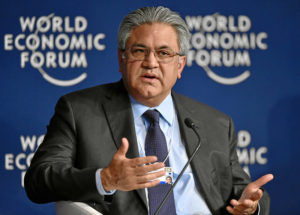
You know I have been warning you about the big business billionaires who sell ways to save the world, like ESG funds, while really they’re just charging you higher fees for a repackaged index fund. For them, it’s all about their EGO.
Now, The Wall Street Journal’s Simon Clark reports on another example of investors being sold the idea of saving the world, only to be bilked by another pretender. Clark writes:
“It’s a crucial moment in history. It’s an opportunity to immutably and absolutely change the course of innumerable lives.”
Arif Naqvi, a silver-haired man of soft, bearish charm, was giving the biggest speech of his life. Hundreds of business leaders were gathered at New York City’s Mandarin Oriental hotel to hear him speak on that Monday morning in September of 2017. This was his moment. The eyes of the global elite were on him and he knew he needed to make a big impression.
The U.S. press had published glowing articles about Mr. Naqvi, who socialized with billionaires, royalty and politicians. Bill Gates, Prince Charles and John Kerry were among those he interacted with for business or philanthropy. He was a member of influential boards at the United Nations and Interpol. He had signed Warren Buffett’s Giving Pledge, and had been touted as a potential future leader of Pakistan, where he was born.
He was one of the world’s leading “impact investors,” and his stated purpose was to do good and make profits—for his investors and for himself. Abraaj Group, his Dubai-based private-equity firm, managed almost $14 billion and owned stakes in a hundred companies in emerging markets. Abraaj appeared to be a moneymaking machine and was raising $6 billion from investors for a new fund.
It was no coincidence that world political leaders were meeting at the same time a short walk away at U.N. headquarters. Mr. Naqvi’s objective at the impact-investing conference, which he was sponsoring alongside Bank of America Corp. , was to convince his audience that he could solve humanity’s biggest problems—hunger, sickness, illiteracy, climate change and power shortages—better than the politicians assembled across town. Bank of America, which invested in Abraaj, declined to comment for this account.
“To do good does not necessarily mean to compromise returns,” Mr. Naqvi said, pacing back and forth upon the stage. “It is gratifying that we are having this event on morning one, day one and hour one of the U.N. General Assembly week.”
A revolution in finance was needed and he was going to lead it. He wasn’t just harnessing capitalism to make money for the rich but to end the suffering of the poor as well. The era of the impact investor had arrived, he said.
The crowd swelled with applause.
It was a masterly performance, but Mr. Naqvi’s sunny optimism on stage masked deep chaos at his firm. Legal filings in the U.S. and regulatory proceedings in Dubai have since shown the company’s finances were in a disastrous state.
Rafique Lakhani, an employee whose job was to manage Abraaj’s cash, had emailed Mr. Naqvi days before the speech to tell him there was no money left to pay for promised investments in hospitals in poor countries, which he asked to be delayed.
This account is based on interviews with Abraaj investors and former employees, as well as company emails and bank statements, a regulatory investigation into Abraaj in Dubai and legal filings in civil and criminal cases the U.S. government has brought against Mr. Naqvi and five of his most senior former colleagues. Mr. Lakhani, Abraaj’s former cash manager, is among the indicted executives. Former colleagues believe he is in Pakistan. He didn’t respond to requests for comment.
Mr. Naqvi, 60 years old, has maintained his innocence of the U.S. charges, which overlap significantly with the Dubai investigation, and he declined to comment for this article. He is currently out on bail and living in London. U.K. authorities have ordered his extradition to the U.S. to stand trial and he has applied to appeal their decision. One of his former colleagues, Mustafa Abdel-Wadood, has pleaded guilty in the U.S.
Behind the facade of operating a successful investment company capable of improving billions of lives, Mr. Naqvi was masterminding a global criminal conspiracy, according to U.S. prosecutors. Abraaj didn’t have any money left on the day of the 2017 conference because he had stolen it, according to the prosecutors, who allege that he took hundreds of millions of dollars and misused money from investors including the Bill & Melinda Gates Foundation, Bank of America, public pension funds, and the U.S., U.K. and French governments. Abraaj improperly or fraudulently transferred more than $780 million to Mr. Naqvi and other parties for his benefit and he misappropriated more than $385 million of those funds, returning the balance to Abraaj, according to a legal filing from Abraaj’s liquidators.
Abraaj was secretly siphoning hundreds of millions of dollars from its healthcare fund and other funds to pay for Mr. Naqvi’s billionaire lifestyle and expenses and salaries at the firm, according to the U.S. government’s case, the Dubai financial regulator’s investigation and company and investor documents.
Action Line: How many Arif Naqvis are out there? If someone promises you can have it all and save the world, you need to immediately be skeptical. If not, you invest, and they win.



